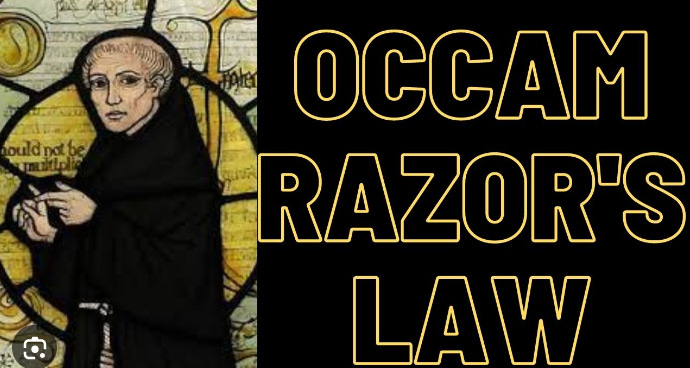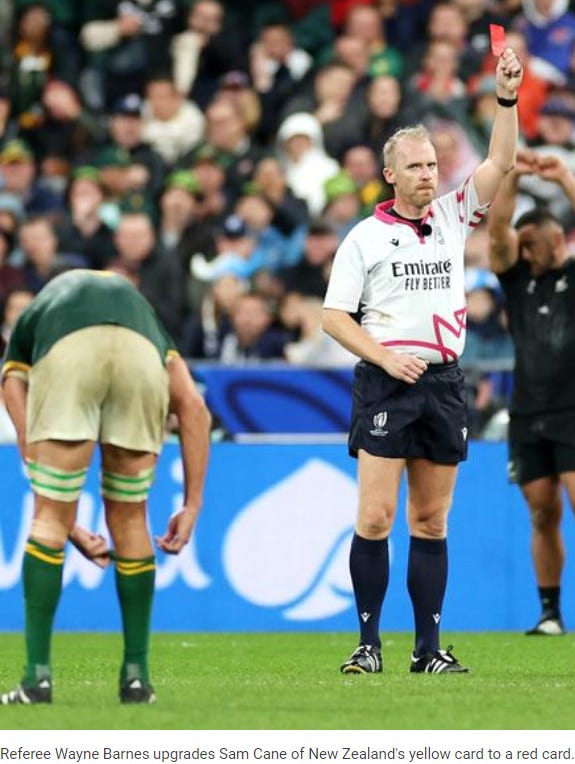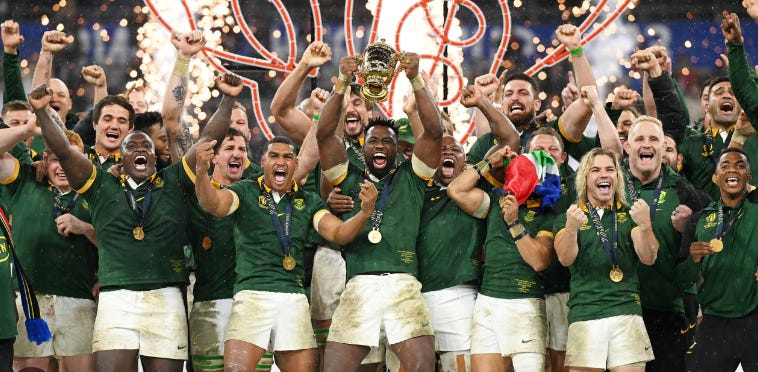APPLYING A CERTAIN RAZOR TO RUGBY WORLD CUP FINAL OFFICIATING
The Simplest Explanation is the Best
Scott “Razor” Robertson has succeeded Ian “Fozzie” Foster as the coach of the All Blacks, and good luck to Robertson. But we’re not here to talk about Razor The Coach.
Let’s employ a razor that’s neither a nickname nor a sharp instrument for the removal of unwanted body hair. I’m talking Occam’s Razor - also known as Ockham’s Razor. (No-one should get too worked up about spellings - Shakespeare spelt his own name at least four different ways.)
Occam's Razor is the philosophical principle that the best explanation for an occurrence is the one that requires the fewest assumptions. Or, in other words, the simplest explanation is usually the best.
Armed with Occam’s Razor, let’s analyse the possibility that match officials in the most recent Rugby World Cup Final may have done the unmentionable – that they may have deliberately cheated in favour of the South African side, the “Springboks”.
But first up…Grow up! May I disabuse you of any naïve notions that sporting referees/umpires/officials never cheat. For example, Australian international cricket umpire Darrell Hair was - why split hairs? - an inveterate cheat in favour of his beloved home country. Even in retirement Hair continued to cheat, pleading guilty in his dotage to embezzlement and stealing. So some sporting officials can and do, on occasions, cheat.
A Dirty Half Dozen of Doozy Decisions
The 2023 Rugby World Cup Final was replete with indisputable instances of the officials favouring the Spingboks. My Dirty Half Dozen are as follows:
Yellow Frizell
The writing was on the wall early for the All Blacks when Shannon Frizell was yellow carded for…well…what? In general play Frizell’s body weight ended up on the legs of Springbok hooker Bongi Mbonambi. That sort of thing happens in rugby. It’s a contact sport. Players get hurt without rules being broken. Match officials couldn’t even say what rule Frizell was alleged to have broken. Nonetheless, prompted by television match official (TMO) Tom Foley, referee Barnes yellow carded Frizell, sending him from the field for a crucial 10 minutes.
The Etzebeth Elbow
In open play, right in front of referee Stuart Barnes and with Barnes looking straight at the incident, Eben Etzebeth deliberately elbowed All Blacks prop Ethan de Groot in the face, injuring him. Bewilderingly, Barnes and TMO Foley did precisely nothing.
The Etzebeth “Lazy Running”
The Teflon Etzebeth was cynically offside to snooker an All Blacks attack, deliberately getting in the way of a pass from Aaron Smith. Rugby’s rules require such conduct to attract at least an automatic yellow card. And in this case, Etzebeth stopped a potential try, so it’s strongly arguable that the officials should have red carded Etzebeth and awarded the All Blacks a penalty try. But no. Inexplicably, Etzebeth’s infraction attracted only a standard penalty.
What’s the difference between a Cane and a Kolisi? Nothing except the jersey
Early on in the RWC Final, All Blacks Captain Sam Cane was of course red carded and sent off for the rest of the match. Referee Stuart Barnes had yellow carded Cane for a “high shot” tackle but TMO Foley intervened and insisted on a red card. Later in the game however, for materially the same sort of high shot (head-butting Ardie Savea), Springbok Captain Kolisi only received a yellow card. On this occasion, Foley stayed silent. The differential treatment of Cane and Kolisi was glaring and only explicable as deliberate bias and preferential treatment for the revered Springbok captain.
After the game, All Blacks coach Foster diplomatically called the Cane and Kolisi incidents “similar”. Former England captain Martin Johnson was less diplomatic in his commentary: “Kolisi put his head into someone’s jaw and stayed on the field…One captain has been off the field for 50 minutes and one hasn’t”.
Kwagga Smith, hands down
With one minute remaining in the Final, Springbok Super-Sub Kwagga Smith completed a crucial turnover to extinguish the All Blacks’ hopes.
But it should instead have been a penalty to the All Blacks, because – right in front of referee Barnes - Smith put his hands on the ground as he made the turnover, which is not allowed within the rules of rugby.
Rugby Law 15.6 states: “After a tackle, all other players must be on their feet when they play the ball. Players are on their feet if no other part of their body is supported by the ground or players on the ground.”
The punishment for breaching law 15.6 is a penalty, which would have given New Zealand a crucial final opportunity to overturn the one-point deficit and win the Rugby World Cup.
Foley suddenly can’t count
Rugby Laws dictate that, in assessing whether a try can be awarded (i.e. whether there has been any prior infringement by the putative try-scoring side), officials can only go back two phases of play. But TMO Tom Foley had other ideas. As explained by formidable wordsmith and sports journalist Mark Reason…
This was the real officiating scandal of the final and it was wrong, wrong and five times wrong. The try that Richie Mo’unga created and Aaron Smith scored should not have been erased. But Tom Foley, the TMO, just could not help from interfering. He was drunk with power by this point. So he told Wayne Barnes, the referee, to look at a knock on at a lineout that had happened five phases earlier. All was obliterated when Foley said in schoolmaster English: “Barnesy, I’m about to show you a knock on by New Zealand eight”.
In communicating with his chum “Barnesy”, Foley conveniently forgot not only how to count but also to tell Brother Barnes how many phrases he’d gone back in order to find the try-cancelled knock-on (which Barnes had earlier deemed not to have been a knock-on). Foley certainly knows the rules and can count. This therefore simply cannot have been an innocent mistake. And Foley had “form”. He had been brazenly biased as TMO in the 2022 All Blacks-Ireland series. For all practical purposes, we can be sure Foley was cheating against the All Blacks and in favour of the Springboks.
The unmentionable “mistakes”
Occam’s Razor therefore produces a clean-shaven result. The simplest and most compelling explanation for what unfolded is that the Springbok’s victory was the product of cheating by match officials. Their hatchet job done, Barnes and Foley each conveniently retired from officiating immediately after the Final.
Given the tsunami of official “mistakes” in which the All Blacks ultimately drowned, it’s remarkable how little media attention and general public commentary their fate received. Why might this be?
The horribly troubling reality is that what happened was not the product of one individual’s isolated swindle. The rip off was concerted. So, either the officials conspired amongst themselves to skew the pitch in favour of the Springboks or, even more mind-f**kingly, they were acting on instructions from World Rugby High Priests to produce the “right” result for the Rainbow Nation. Who knows.
There’s something spooky about Springbok rugby. It’s as if questioning what happens in Springbok Land is disrespecting the ghost of Nelson Mandela, or racist, or something. News items like this are as scarce as hen’s teeth:
https://rugbyonslaught.com/south-africa-world-cup-title-in-jeopardy-as-damning-new-evidence-emerges-of-cheating-at-rugby-world-cup/
As unholy as the reality may be, our Glorious Game of Rugby could well be cooked. Which is hard to swallow.










Take it to "The Joodishereee".